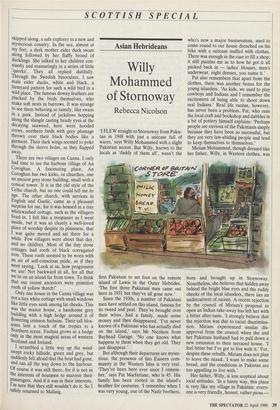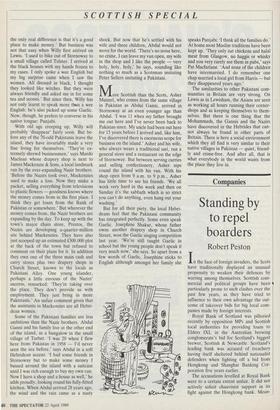Asian Hebrideans
Willy Mohammed of Stornoway
Rebecca Nicolson
'I FLEW straight to Stornoway from Pakis- tan in 1948 with just a suitcase full of wares,' says Willy Mohammed with a slight Pakistani accent. But Willy, known to the locals as 'daddy of them all', wasn't the first Pakistani to set foot on the remote island of Lewis in the Outer Hebrides. 'The first three Pakistani men came out here in 1931 but they've all gone now.'
Since the 1930s, a number of Pakistani men have settled on this island, famous for its tweed and peat. They've brought over their wives, had a family, made some money and then disappeared. 'I've never known of a Pakistani who has actually died on the island,' says Mr Nicolson from Bayhead Garage. 'No one knows what happens to them when they get old. They just disappear.'
But although their departures are myste- rious, the presence of this Eastern com- munity in the Western Isles is very real. 'They've been here ever since I remem- ber,' says Pat Macfarlane, who is 45. His family has been rooted in the island's heather for centuries. 'I remember when I was very young, one of the Nazir brothers, who's now a major businessman, used to come round to our house drenched on his bike with a suitcase stuffed with clothes. There was enough in the case to fill a shop; it still puzzles me as to how he got it all packed back in — ladies' blouses, men's underwear, night dresses, you name it.'
Pat also remembers that apart from the clothes, there was another bonus for the young islanders. 'As kids, we used to play cowboys and Indians and I remember the excitement of being able to shoot down real Indians.' Real life racism, however, has never been a problem. Pat, who runs the local craft and bookshop and dabbles in a bit of pottery himself explains: 'Perhaps people are envious of the Pakistanis simply because they have been so successful, but they are very law-abiding people and tend to keep themselves to themselves.'
Miriam Mohammed, though dressed like her father, Willy, in Western clothes, was born and brought up in Stornoway. Nonetheless, she believes that hidden away behind the bright blue eyes and the ruddy cheeks of the local islanders, there lies an undercurrent of racism. A recent rejection by the council of Miriam's proposal to open an Indian take-away has left her with a bitter after-taste. 'I strongly believe that the rejection was due to racial discrimina- tion. Miriam experienced similar dis- approval from the council when she and her Pakistani husband had to pull down a new extension to their terraced house. 'I feel bitter but I've got to live with it.' For, despite these rebuffs, Miriam does not plan to leave the island. 'I want to make some bread, and the conditions in Pakistan are too appalling to live with.'
Her father, Willy, is less sceptical about local attitudes. 'In a funny way, this place is very like my village in Pakistan: every- one is very friendly, honest, rather pious —
SCOTTISH SPECIAL
the only real difference is that it's a good place to make money.' But business was not that easy when Willy first arrived on Lewis. 'I used to bike out of Stornoway to a small village called Tolster. I arrived at the black houses with my hands frozen to my cases. I only spoke a wee English but my big surprise came when I saw the women. All dressed in black, I thought they looked like witches. But they were always friendly and asked me in for some tea and scones.' But since then, Willy has not only learnt to speak more then a wee English: he's also picked up some Gaelic. Now, though, he prefers to converse in his native tongue: Punjabi.
With old age creeping up, Willy will probably `disappear' fairly soon. But be- fore any of the 70-odd Pakistanis leave the island, they have invariably made a very fine living for themselves. 'They're ex- tremely shrewd businessmen,' says Murdo Maclean whose drapery shop is next to James Mackenzie & Sons, a local landmark run by the ever-expanding Nazir brothers. 'Before the Nazirs took over, Mackenzies used to make a loss. Now they make a packet, selling everything from televisions to plastic flowers — goodness knows where the money comes from in the first place. I think they get loans from the Bank of Pakistan or somewhere.' But wherever the money comes from, the Nazir brothers are expanding by the day. To keep up with the town's major chain store, Prestos, the Nazirs are developing a-quarter-million site behind Mackenzies. They have also just scooped up an estimated £300,000 plot at the back of the town but refused to comment on their plans for it. In addition they own one of the three main cash and carry stores plus two drapery shops in Church Street, known to the locals as Pakistani Alley. One young islander, perhaps a little envious of the Nazirs' success, remarked: 'They're taking over the place. They don't provide us with employment. They just bring in more Pakistanis.' An unfair comment given that the assistants in Mackenzies are all Hebri- dean women.
Some of the Pakistani families are less ambitious than the Nazir brothers. Abdul Ganni and his family live at the other end of the island, in a bungalow in the small village of Tarbet. 'I was 20 when I flew here from Pakistan in 1958 — I'd never seen the sea before,' says Abdul in a soft Hebridean accent. 'I had some friends in Stornoway but to make some money I bussed around the island with a suitcase until I was rich enough to buy my own van. Now I have a shop and a house as well,' he adds proudly, looking round his fully-fitted kitchen. When Abdul arrived 28 years ago, the wind and the rain came as a nasty shock. But now that he's settled with his wife and three children, Abdul would not move for the world. 'There's no noise here, no crime, I can leave my van open, my wife in the shop and I like the people — very holy, holy, holy,' he says, sounding like nothing so much as a Scotsman imitating Peter Sellers imitating a Pakistani.
More Scottish than the Scots, Asher Munzel, who comes from the same village in Pakistan as Abdul Ganni, arrived in Stornoway at an even younger age than Abdul. 'I was 11 when my father brought me out here and I've never been back to Pakistan since. My uncle had been out here for 15 years before I arrived and, like him, I've discovered there is enormous scope for business on the island.' Asher and his wife, who always wears a traditional sari, run a general store and a restaurant on the edge of Stornoway. But between serving curries and selling confectionery, Asher nips round the island with his van. With his shop open from 9 a.m. to 9 p.m., Asher has little time to see his friends. 'We all work very hard in the week and then on Sunday it's the sabbath which is so strict you can't do anything, even hang out your washing.'
But for all their piety, the local Hebri- deans feel that the Pakistani community has integrated perfectly. Some even speak Gaelic. Josephine Shakur, whose father owns another drapery shop in Church Street, won the Gaelic singing competition last year. 'We're still taught Gaelic in school but the young people don't speak it very much now,' she says. So apart from a few words of Gaelic, Josephine sticks to English although amongst her family she speaks Punjabi: 'I think all the families do.' At home most Muslim traditions have been kept up. 'They only eat chickens and halal meat from Glasgow, no haggis or whisky and you very rarely see them in pubs,' says Pat Macfarlane. 'And none of the children have intermarried. I do remember one chap married a local girl from Harris — but they disappeared years ago.'
The similarities to other Pakistani com- munities in Britain are very strong. On Lewis as in Lewisham, the Asians are seen as working all hours running their corner- shops and as keeping themselves to them- selves. But there is one thing that the Mohammeds, the Gannis and the Nazirs have discovered in the Hebrides that can- not always be found in other parts of Britain. There is here a social environment which they all find is very similar to their native villages in Pakistan — quiet, friend- ly and crime-free. And after all, that is what everybody in the world wants from the place they live in.



































































 Previous page
Previous page